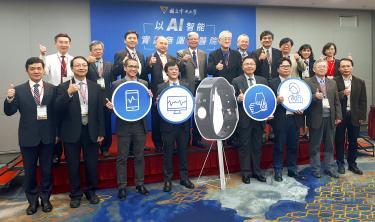
National Central University researchers have developed a wearable smartwatch device that can check heart function through an electrocardiogram (ECG) test and determine whether the user has an irregular heartbeat or could be at risk of a stroke.
A team from the College of Health Sciences and Technology developed the device as part of the “AI-realized fenceless hospital” program.
The wearer needs to press on the device’s surface with their index finger for one to two minutes to perform an ECG test, team member Lin Chen, an assistant professor in biomedical science and engineering, told a news conference on Monday last week.
Using real-time analysis provided by an artificial intelligence-based cloud ECG reading system, the device can determine whether the user has atrial fibrillation (AF) or an irregular heartbeat (arrhythmia), which could lead to blood clots, stroke, heart failure and other complications, Lin said.
The data collected by the smartwatch, which can detect AF with 97 percent accuracy, can be used to monitor chronic disease or identify high-risk patients, he added.
While AF is a common form of arrhythmia clinically, only about one in 100 people has the condition, placing them at high risk of a stroke, Lin said.
The device can help identify those most at risk so they can seek immediate medical treatment, he added.
The US Food and Drug Administration in 2018 certified the device for medical treatment, the team said.
Taiwan Landseed Hospital physician Lin Ying-kuang said that people’s heart rates change continuously, so arrhythmia cannot always be detected at hospitals, so it is vital for people to be able to monitor their health at home.
With the smartwatch, people can have their heartbeat measured whenever they feel unwell and physicians can monitor the measurement using the data uploaded by the watch to the cloud system, Lin Ying-kuang said.
Since June 2018, the team has worked with health authorities in Taipei and Taoyuan, and Cathay General Hospital Hsinchu to perform AF screening through ECG tests conducted using the device, the university said.
In May last year, the screening was expanded to communities in Hsinchu, Tainan and Pingtung County with local health departments’ assistance, the team said, adding that as a result of the mass screening, it has so far acquired ECG data on more than 10,000 people.
The tests found that about 15 percent of the people have arrhythmia, with 2 percent of those over 65 developing AF, it said.